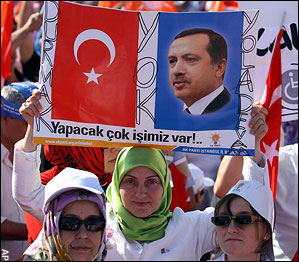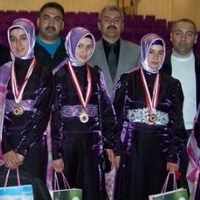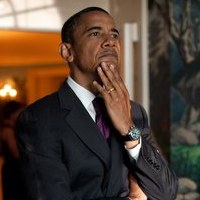![]()
Mon, June 13, 2011 | Rubin Reports | By Okan Altiparmak
The Outcome of the Turkish Election: Exclusive Report From Istanbul for Rubin Reports
Introduction: This assessment is a bit more optimistic than mine, suggesting ways to limit the new government’s power. I’m doubtful that this is going to succeed but clearly it is the proper course to pursue. At the same time, the article points out that the turnout is so high as to be possibly suspicious. Again, the problem is that after four more years of AKP rule that regime may be well enough entrenched to stay in power a very long time — or change the political structure of Turkey to do what it wants. — Barry Rubin
Let’s put everything in perspective:
2007 Voter turnout: 85.1%
Total number of votes: 35,017,315
2011 Voter turnout: 87%
Total number of votes: 42,906,852
AKP
2007 election: 46.6% (21.4 Million votes)….. 341 MP’s (62% of the parliament)
2011 election: 49.91% (16.3 Million votes)….. 326 MP’s (59% of the parliament)
Up 3.31% tallying 5.1 Million more votes….. 15 fewer MP’s
CHP
2007 election: 20.84% (7.3 Million votes)….. 112 MP’s (20.4% of the parliament)
2011 election 25.91% (11.1 Million votes)….. 135 MP’s (24.5% of the parliament)
Up 5.07% tallying 3.8 Million more votes….. 23 more MP’s
MHP
2007 election: 14.26% (5 Million votes)….. 71 MP’s (12.9% of the parliament)
2011 election: 13% (5.6 Million votes)….. 53 MP’s (9.6% of the parliament)
Down 1.26% despite tallying 600,000 more votes….. 18 MP’s fewer
BDP-backed Independents [Kurdish party]
2007 election: 4.4% (1.5 Million votes)….. 22 MP’s (4% of the parliament)
2011 election 6.6% (2.6 Million votes)….. 36 MP’s (6.5% of the parliament)
Up 2.2% tallying 1.1 Million more votes….. 14 more MP’s
Votes for parties that didn’t gain parliamentary representation
2007: About 4.6 Million votes (12.9%) under the 10% threshold to enter the parliament
2011: About 2 Million votes (4.5%) under the 10% threshold to enter the parliament
The increase of 7.9 million voters (from 2007 to 2011) and the 2.6 million votes which went to parties under the 10% threshold in 2007 approximately correspond to the increase of 10.6 million votes that the parties that got into the parliament in 2011 tallied, with the AKP receiving 5.1 million of these 10.5-10.6 million additional votes.
However, the increase in the number of voters between 2007 and 2011 is rather strange because for it to be possible, there would have had to be such a jump in the birth rate between the years of 1989 and 1993. When we check the population of Turkey in those years, we notice an increase of 8.3 million from 56.5 million in 1990 to 62.9 million in 1997, i.e. less than 1 million per year. Nor can we find a jump in the Turkish population at a later point in time, a fact which would make an increase of 7.9 million voters in four years impossible unless a good number of voters did not get a chance to vote in 2007 when the AKP had its first huge break-through, jumping from 34% to nearly 47% in five years.
On the more positive side, the first-ever Syrian Orthodox (“Süryani” in Turkish) MP (an independent) was elected.
The number of female MP’s has gone up from 50 to 78 (an increase of 56%). Ironically, 45 are from AKP, 19 from CHP, 3 from MHP and 11 from the BDP-backed independents. This is a historical peak for the Turkish parliament.
In summary, the AKP stayed in power, but lost a little (yet crucial) ground as did the MHP by a much larger margin, by 25%. On the other hand, the CHP increased its number of MP’s by 20.5% and the BDP-backed independents by 63.6%. Hence, while the AKP has much to cheer about for staying in power and the CHP for improving its lot, albeit to a much lesser degree, the BDP-backed independents and women are the real winners of these elections.
Moreover, there is a chance, however little, that the Turkish people may also win if the opposition parties and the independents behave responsibly and force the AKP into governing the nation democratically. But don’t count on it on either end. It is more likely that trouble looms ahead with the AKP continuing its authoritarian ways and the opposition failing to bond together. Nor can we, based on the last nine years, expect the USA and Europe to pressure the AKP into responsible governance.
The AKP has been the baby the Western publications and think-tanks (those leaning left in particular) love to spoil and is likely to stay that way until Erdogan and the AKP self-destruct or the West totally loses Turkey as an ally.
Okan Altiparmak, an alumnus of Northwestern University in the field of economics. He is a consultant and filmmaker based in Istanbul.



 RSS
RSS











The Outcome of the Turkish Election: Exclusive Report From Istanbul for Rubin Reports | #Turkey #AKP #Elections http://j.mp/kNbZhV
The Outcome of the Turkish Election: Exclusive Report From Istanbul for Rubin Reports | #Turkey #AKP #Elections http://j.mp/kNbZhV
The Outcome of the Turkish Election: Exclusive Report From Istanbul for Rubin Reports | #Turkey #AKP #Elections http://j.mp/kNbZhV